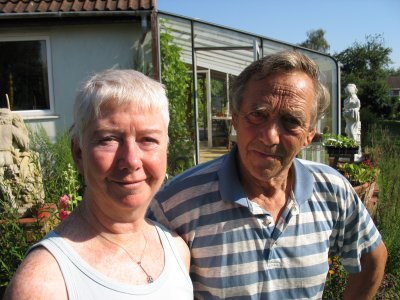
Denis was born in 1934 at Corpus Christi College where his father was a college servant or ‘scout’ as the occupation is called in Oxford. The family occupied a college house in Magpie Lane adjacent to Oriel, Merton and University Colleges and near the back entrance to Christ Church. Most of Denis’s early life was spent in this area.
The first visit to an air raid shelter that Denis remembers was in 1941. The Luftwaffe was making raids on Coventry and finding their way there by following the River Thames to Oxford, and then the railway line from Oxford to Coventry and Birmingham. On one occasion he was ready for bed at about seven o’clock in the evening when he saw German aeroplanes flying overhead wing tip to wing tip. He was quickly ushered out in pyjamas and dressing gown, and taken to rooms below the College. While there he sat on the knee of a gentleman who told him a story. This man had a strange accent and Denis asked him why this was. The gentleman told him that it was because he was a Russian Jew. Denis was rather dismayed about this, but the man told him that there are good and bad in every country. He later found out that he was sitting on the knee of Isaiah Berlin (1909-1997, a famous philosopher and historian of ideas whose family had emigrated to England in 1920).
Denis was a soprano chorister in his early days and practised at Manchester College, which was used during the war as a shadow Admiralty Office. The younger choristers got up to all sorts of pranks. While the choirmaster was busy playing the organ, the boys could go on their hands and knees under the benches and find a spiral staircase that took them to a roof that had a fortified parapet and walkways. They could go all over the roof of Manchester College, which was almost linked with Wadham College, so the boys could go from one to the other.
Oxford wasn’t systematically bombed unlike Coventry and Denis remembers thinking what on earth they would do when there was peace, as there wouldn’t be any news.
The Oxford and Cambridge boat race was held on the River Thames in some of the war years. These were unofficial boat races but nevertheless were important for the universities. One race took place between Sandford and Oxford. Denis got the bus to Sugworth Crescent at the northern end of Radley and walked down Sandford Lane to watch the crews set off. [Note: There was an unofficial boat race at Henley in 1940 and another between Sandford and Oxford in 1943. Also in 1943 there was a race from Black Bridge (Nuneham railway bridge) to the island by Radley College boathouse. It is estimated 7,000–10,000 people watched the latter race from the riverbank.]
When one of the students left the college, Denis’s father was given an old bicycle which he gave to his son. Denis was delighted to have it and did it up. One day in the later years of the war, Denis went on a bike ride from Oxford. He cycled from Redbridge to the Tandem pub in Kennington on a raised footpath because of the floods. He got to Radley eventually. After Sugworth Crescent, he was on new ground as he had never been there before. There were no mileposts, as they had been taken down during the war in case of enemy paratroopers. He got to the corner by Radley Church and tossed a coin to see whether he should go left or straight on. He turned left, past a string of houses towards the pub and came across an army encampment full of tents and soldiers waiting to go to France for the D-Day landings. Everything was painted with black and white stripes. They were in a sort of gap between the houses and he ventured in. There was a lovely smell of bread and cakes, which were being baked by the Army Logistics Corps. There seemed to be a lot of foreign troops, probably Poles and one of them asked what he was doing there. They didn’t like the idea that Denis was snooping around, but they gave him a penny bun and told him to go on his way. He thinks they were near to where Stonhouse Crescent is now.
Jenny, who was born in 1940, lived in Headington, Oxford. Her bedroom faced towards Southfields Golf Course and Cowley. There was nothing between their house and the beginnings of Cowley. She remembers that, after the armistice in May 1945, she looked out of her window and thought there were a lot of stars out that night. Her mother nearly cried because it was the first time her daughter had seen streetlights, which had been turned off during the war.
The Churchill Hospital, which was across the valley from where Jenny’s family lived, was used by the US Army during the war. Its mail was delivered by aeroplane and one day Jenny remembers running into her house in great excitement saying that a bomber had flown at tree-top height over the valley and dropped the mail bags for the hospital. A lot of American equipment was left behind after the war and her father noticed this when he went in for an operation.
Interviewed by Tony Rogerson on 18 July 2006